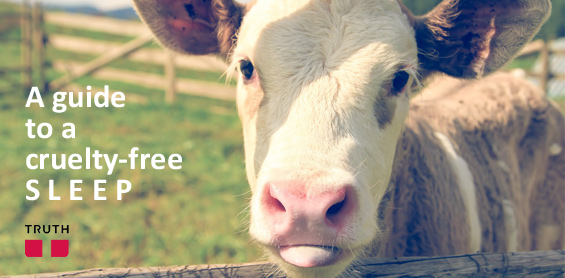Our bedrooms are supposed to be havens of peace and tranquility. For a vegan-in-the-know however it can often be very hard not to look around the room and wince in horror. You see, it turns out the textile industry has a few nasty little secrets when it comes to animal cruelty and your bedroom furnishings.
Below I will unveil exactly what you need to watch out for when trying to veganize your bedroom. A word of warning, going vegan in the bedroom department won’t be cheap but it will be worth it for guilt free sleep.
Down with down
No one is going to argue that a down-filled pillow or duvet is not incredibly comfortable. Down feathers are popular for their lightness yet warmth. Yep, and that’s exactly why the geese and ducks they’ve been ripped from like them too.
You might think I’m being melodramatic when I use the word ‘ripped’ instead of plucked. Well, maybe but when reports suggest anywhere between 45-90% of the down used in bedding is extracted from the birds when they are still alive, it seems appropriate to me.
Yep, in the three major down producing countries in the world, Hungary, Poland and China, the process of live plucking is still going strong. Such is the concern about Chinese feathers that Swedish furniture giant Ikea was forced to sever connections with it’s down suppliers in the country.
Some claim that feathers plucked from live birds are simply of better quality but it’s likely the real reason for this is seemingly barbaric practice is simple economics. If slaughter a bird and then pluck it you only get one crop. If however you pluck a bird while it’s still alive, the feathers will regrow relatively quickly and then the same animal can be subjected to the same process again, and again.
Just in case you may be thinking that maybe live plucking doesn’t hurt the birds. Research suggests it definitely does. Which shouldn’t be surprising. Imagine someone holding you down and pulling all the hairs out of your head. Not very nice right?
Mattress madness
Why do cows sleep standing up? Because if they slept on a mattress they would be supporting the dairy trade, that’s why!
Obviously I’m being flippant and a little silly but the central point stands. For some bizarre reason the latex that most mattresses are made from contains relatively high levels of casein. This being a protein that makes up about 80% of cow’s milk.
So if you’re worried about how cows are treated in the dairy trade – and you should be – it could be time to shop around for a slightly more ethical bed.
Time to give two sheets
Nobody is going to deny that silk feels absolutely amazing against your skin. It just does.That’s a fact. But once you know the way it’s extracted from the poor silkworms, who are boiled alive in their cocoons, it’s difficult to look at those sheets the same way again.
Considering the high price of silk, consumers are actually paying a premium for the cruelty. Many completely humane alternatives to silk exist, such as nylon, polyester, rayon, ceiba tree filaments, silk-cotton tree and milkweed seed pod fibres. While they may not feel as luxurious they are generally substantially cheaper and light years more ethical.
Why pay more money for more suffering?
Vegan Alternatives
Now you’ve read this you might end up sleeping on the floor tonight. But don’t worry there are many alternatives to traditional bedding. Perfectly comfortable all-natural sleeping surfaces can be produced, without the use of petroleum-based products from all natural fibers, such as buckwheat.
The best thing about this is that buckwheat is completely biodegradable, so when it comes to finally disposing of your mattress you don’t have to worry about it sitting in some landfill from now to the end of time. That’s what I call a guilt-free bedtime!
If the idea of birds being live plucked just so you get a nice soft pillow fills you with horror, then there are many alternative stuffings that are equally comfortable and a damn-sight kinder to the world. These include cotton, bamboo, millet hull, buckwheat and even hemp. You can even get pretty sweet belts made from hemp.
Final Thoughts
Nobody told you being a vegan was going to be easy. At least I hope they didn’t?!
If you thought that the difficult choices you had to make would end in the kitchen, then it’s likely discovering your bedroom is a minefield of animal exploitation has probably come as a bit of a shock. I apologise for that but now you also know how easy it is to find ethical alternatives.
Furnishing your bedroom ethically may require a little bit of a financial strain initially but remember items like mattress, pillows and sheets last for years. They are not a frivolous purchase but an investment, both in your comfort and in your peace of mind.

